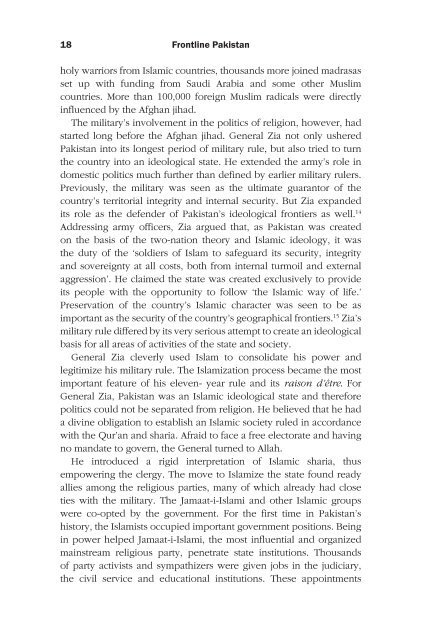Frontline Pakistan : The Struggle With Militant Islam - Arz-e-Pak
Frontline Pakistan : The Struggle With Militant Islam - Arz-e-Pak
Frontline Pakistan : The Struggle With Militant Islam - Arz-e-Pak
Create successful ePaper yourself
Turn your PDF publications into a flip-book with our unique Google optimized e-Paper software.
1 <strong>Frontline</strong> <strong><strong>Pak</strong>istan</strong><br />
holy warriors from <strong>Islam</strong>ic countries, thousands more joined madrasas<br />
set up with funding from Saudi Arabia and some other Muslim<br />
countries. More than 100,000 foreign Muslim radicals were directly<br />
influenced by the Afghan jihad.<br />
<strong>The</strong> military’s involvement in the politics of religion, however, had<br />
started long before the Afghan jihad. General Zia not only ushered<br />
<strong><strong>Pak</strong>istan</strong> into its longest period of military rule, but also tried to turn<br />
the country into an ideological state. He extended the army’s role in<br />
domestic politics much further than defined by earlier military rulers.<br />
Previously, the military was seen as the ultimate guarantor of the<br />
country’s territorial integrity and internal security. But Zia expanded<br />
its role as the defender of <strong><strong>Pak</strong>istan</strong>’s ideological frontiers as well. 14<br />
Addressing army officers, Zia argued that, as <strong><strong>Pak</strong>istan</strong> was created<br />
on the basis of the two-nation theory and <strong>Islam</strong>ic ideology, it was<br />
the duty of the ‘soldiers of <strong>Islam</strong> to safeguard its security, integrity<br />
and sovereignty at all costs, both from internal turmoil and external<br />
aggression’. He claimed the state was created exclusively to provide<br />
its people with the opportunity to follow ‘the <strong>Islam</strong>ic way of life.’<br />
Preservation of the country’s <strong>Islam</strong>ic character was seen to be as<br />
important as the security of the country’s geographical frontiers. 15 Zia’s<br />
military rule differed by its very serious attempt to create an ideological<br />
basis for all areas of activities of the state and society.<br />
General Zia cleverly used <strong>Islam</strong> to consolidate his power and<br />
legitimize his military rule. <strong>The</strong> <strong>Islam</strong>ization process became the most<br />
important feature of his eleven- year rule and its raison d’être. For<br />
General Zia, <strong><strong>Pak</strong>istan</strong> was an <strong>Islam</strong>ic ideological state and therefore<br />
politics could not be separated from religion. He believed that he had<br />
a divine obligation to establish an <strong>Islam</strong>ic society ruled in accordance<br />
with the Qur’an and sharia. Afraid to face a free electorate and having<br />
no mandate to govern, the General turned to Allah.<br />
He introduced a rigid interpretation of <strong>Islam</strong>ic sharia, thus<br />
empowering the clergy. <strong>The</strong> move to <strong>Islam</strong>ize the state found ready<br />
allies among the religious parties, many of which already had close<br />
ties with the military. <strong>The</strong> Jamaat-i-<strong>Islam</strong>i and other <strong>Islam</strong>ic groups<br />
were co-opted by the government. For the first time in <strong><strong>Pak</strong>istan</strong>’s<br />
history, the <strong>Islam</strong>ists occupied important government positions. Being<br />
in power helped Jamaat-i-<strong>Islam</strong>i, the most influential and organized<br />
mainstream religious party, penetrate state institutions. Thousands<br />
of party activists and sympathizers were given jobs in the judiciary,<br />
the civil service and educational institutions. <strong>The</strong>se appointments













